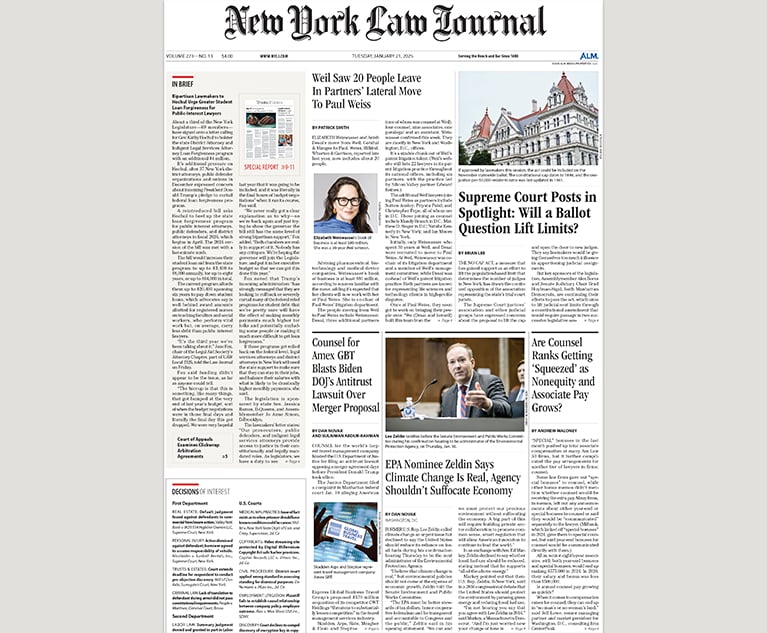Weil, Ex-Client Clash Over Possible Conflicts in Insys Work
While a former Insys sales executive insists he was kept in the dark about alleged conflicts at Weil, the firm argues that there was no conflict and it took steps to prevent even the appearance of a conflict.
September 18, 2019 at 02:45 PM
4 minute read
The original version of this story was published on The American Lawyer
 Photo: Jason Doiy/ALM
Photo: Jason Doiy/ALM
A former sales executive at Insys Therapeutics who is seeking a new trial after a racketeering conviction has cited new evidence that he said shows his ex-lawyers at Weil, Gotshal & Manges kept him in the dark about potential conflicts posed by its simultaneous bankruptcy work for Insys.
Richard Simon was one of five defendants convicted for pushing doctors to prescribe Subsys, a super-potent and addictive painkiller. In his bid for a new trial in Boston federal court, he has argued that Weil could not represent him while working for Insys because the pharmaceutical company's bankruptcy plans were inextricably linked to its cooperation with prosecutors, who were seeking a huge fine from the company.
"Insys was actively assisting in the prosecution of Mr. Simon," his new lawyers at Boston-based Fick & Marx argued in a brief filed last week, in which they incorporate emails and notes from Weil attorneys.
"Weil could not be loyal to both clients. Mr. Simon never provided his informed, written consent to this arrangement. Worse, when he asked his trial counsel, Weil partner Steven Tyrrell, what the Insys engagement would mean for him, Tyrrell responded, 'nothing, really,'" said Simon's defense attorneys Daniel Marx and William Fick.
But Weil denies that there was any conflict, said it took steps to avert the possibility of one and said Simon was fully informed about its work for Insys. Tyrrell said in an affidavit filed Sept. 16 that he told Simon about the pending bankruptcy representation in August 2018, and "Simon stated he understood my explanation, had no questions, and voiced no objection."
Tyrrell also said Weil implemented an ethical screen "to avoid any appearance of impropriety," according to a Weil memo filed in court. He said his firm circulated memos to the team working on Simon's defense and on the Insys bankruptcy that instructed them not to have any discussions or share or access any files concerning each others' matters.
In another point of contention, Simon said Insys cooperated with prosecutors and refused to waive privilege on an investigation conducted by Skadden, Arps, Slate, Meagher & Flom that could have given him the ability to impeach Insys witnesses who implicated him in wrongdoing. But in his affidavit, Tyrrell said he subpoenaed Insys during the trial and tried in good faith to make the case to jurors that Simon had sought to comply with the law in his effort to increase sales.
"Simon assumes that Insys possessed privileged, exculpatory information demonstrating that he acted in good faith," Tyrrell wrote. "During trial, however, the government repeatedly represented that it had received inculpatory information from Insys."
U.S. District Judge Allison Burroughs of the District of Massachusetts has yet to rule on the new trial motions filed by Simon and his codefendants.
Marx, Simon's lawyer, and a Weil representative didn't immediately respond to requests for comment. In a previous statement, the firm has made similar points to those Tyrrell made in his affidavit.
The criminal case against Simon and other Insys executives, including CEO John Kapoor, has been closely watched. Prosecutors accused the defendants of pushing off-label uses of Subsys, which was approved to treat intense so-called breakthrough cancer pain in a way that was no different than drug dealers on street corners. They said the convictions they secured struck a blow against the opioid epidemic that has ravaged much of the U.S.
Simon's attacks on his former lawyers aren't the only case where Weil lawyers have recently drawn headlines.
Just in the last month, the New York Post reported that the firm made mistakes with the compensation of two former bankers at its client Perella Weinberg Partners that could result in a multimillion-dollar liability for the client. The Post reported that Weil recently stepped aside from its representation of the financial firm after the error was revealed. A Weil representative did not immediately return a message seeking comment on that matter.
This content has been archived. It is available through our partners, LexisNexis® and Bloomberg Law.
To view this content, please continue to their sites.
Not a Lexis Subscriber?
Subscribe Now
Not a Bloomberg Law Subscriber?
Subscribe Now
NOT FOR REPRINT
© 2025 ALM Global, LLC, All Rights Reserved. Request academic re-use from www.copyright.com. All other uses, submit a request to [email protected]. For more information visit Asset & Logo Licensing.
You Might Like
View All
Neighboring States Have Either Passed or Proposed Climate Superfund Laws—Is Pennsylvania Next?
7 minute read
Trending Stories
- 1How ‘Bilateral Tapping’ Can Help with Stress and Anxiety
- 2How Law Firms Can Make Business Services a Performance Champion
- 3'Digital Mindset': Hogan Lovells' New Global Managing Partner for Digitalization
- 4Silk Road Founder Ross Ulbricht Has New York Sentence Pardoned by Trump
- 5Settlement Allows Spouses of U.S. Citizens to Reopen Removal Proceedings
Who Got The Work
J. Brugh Lower of Gibbons has entered an appearance for industrial equipment supplier Devco Corporation in a pending trademark infringement lawsuit. The suit, accusing the defendant of selling knock-off Graco products, was filed Dec. 18 in New Jersey District Court by Rivkin Radler on behalf of Graco Inc. and Graco Minnesota. The case, assigned to U.S. District Judge Zahid N. Quraishi, is 3:24-cv-11294, Graco Inc. et al v. Devco Corporation.
Who Got The Work
Rebecca Maller-Stein and Kent A. Yalowitz of Arnold & Porter Kaye Scholer have entered their appearances for Hanaco Venture Capital and its executives, Lior Prosor and David Frankel, in a pending securities lawsuit. The action, filed on Dec. 24 in New York Southern District Court by Zell, Aron & Co. on behalf of Goldeneye Advisors, accuses the defendants of negligently and fraudulently managing the plaintiff's $1 million investment. The case, assigned to U.S. District Judge Vernon S. Broderick, is 1:24-cv-09918, Goldeneye Advisors, LLC v. Hanaco Venture Capital, Ltd. et al.
Who Got The Work
Attorneys from A&O Shearman has stepped in as defense counsel for Toronto-Dominion Bank and other defendants in a pending securities class action. The suit, filed Dec. 11 in New York Southern District Court by Bleichmar Fonti & Auld, accuses the defendants of concealing the bank's 'pervasive' deficiencies in regards to its compliance with the Bank Secrecy Act and the quality of its anti-money laundering controls. The case, assigned to U.S. District Judge Arun Subramanian, is 1:24-cv-09445, Gonzalez v. The Toronto-Dominion Bank et al.
Who Got The Work
Crown Castle International, a Pennsylvania company providing shared communications infrastructure, has turned to Luke D. Wolf of Gordon Rees Scully Mansukhani to fend off a pending breach-of-contract lawsuit. The court action, filed Nov. 25 in Michigan Eastern District Court by Hooper Hathaway PC on behalf of The Town Residences LLC, accuses Crown Castle of failing to transfer approximately $30,000 in utility payments from T-Mobile in breach of a roof-top lease and assignment agreement. The case, assigned to U.S. District Judge Susan K. Declercq, is 2:24-cv-13131, The Town Residences LLC v. T-Mobile US, Inc. et al.
Who Got The Work
Wilfred P. Coronato and Daniel M. Schwartz of McCarter & English have stepped in as defense counsel to Electrolux Home Products Inc. in a pending product liability lawsuit. The court action, filed Nov. 26 in New York Eastern District Court by Poulos Lopiccolo PC and Nagel Rice LLP on behalf of David Stern, alleges that the defendant's refrigerators’ drawers and shelving repeatedly break and fall apart within months after purchase. The case, assigned to U.S. District Judge Joan M. Azrack, is 2:24-cv-08204, Stern v. Electrolux Home Products, Inc.
Featured Firms
Law Offices of Gary Martin Hays & Associates, P.C.
(470) 294-1674
Law Offices of Mark E. Salomone
(857) 444-6468
Smith & Hassler
(713) 739-1250








